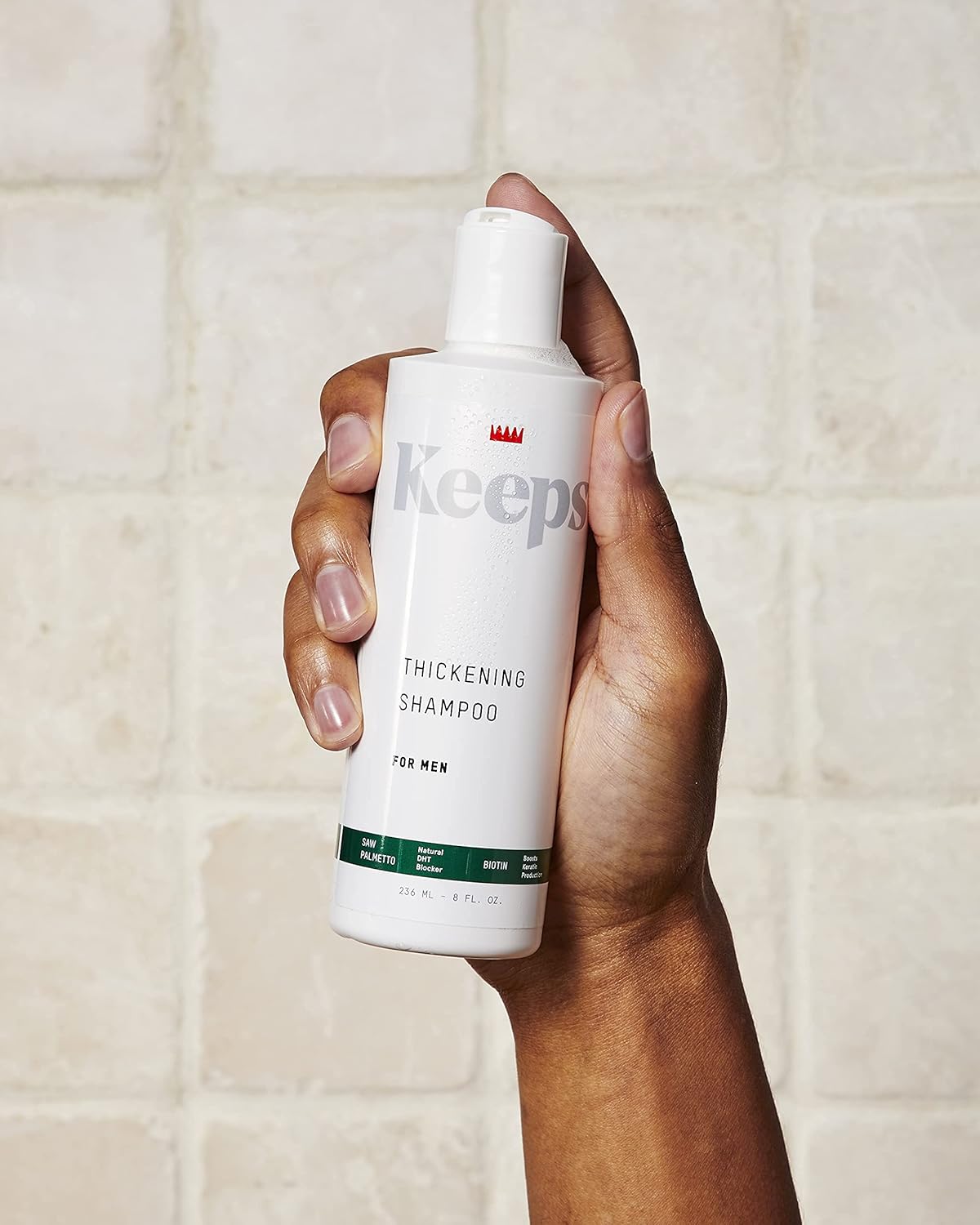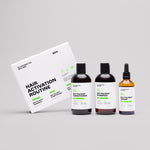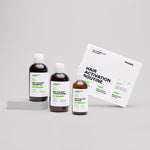DHT is a byproduct of testosterone metabolism that interferes with the normal growth cycle of hair follicles.
High concentrations of DHT make up the hallmark of a chronic condition known as androgenic alopecia.
In a previous article, we listed a number of methods that answers the question "how to remove DHT from scalp". This includes medications, light therapy, and dietary choices.
In this article, we will cover the most common topical DHT blockers and their mechanism of action.
Table of content
What is DHT?
DHT (dihydrotestosterone) is a crucial male hormone naturally present in men’s bodies, significantly influencing their sexual development, especially during puberty.
For instance, DHT is responsible for the growth of the prostate, facial hair, and body hair. Although men have higher levels of DHT, it is also present in women.
Excessive levels of DHT can lead to issues like excessive body hair and scalp hair loss in women, which is why DHT blockers can be helpful.
As your leading source for hair health information over the past 4 years, we never compromise on accuracy. When it comes to your health, you deserve information you can truly rely on - and earning your trust is our top priority.
Here's how Scandinavian Biolabs ensures every piece of content meets the highest standards of accuracy and integrity:
- Credentialed Experts: Our reviewers are actively practicing doctors and medical researchers
- Stringent Reviews: Content undergoes rigorous editing by subject specialists and review by a practicing doctor.
- Evidence-Based: We rely on well-established research from trusted scientific sources like peer-reviewed journals and health authorities.
- Full Transparency: Our editorial standards, writer credentials, reviewer credentials, correction process, and funding are all publicly documented.
- Independent Voice: While we do promote products, we operate in a vacuum to business operations. Our main goal is just an unwavering commitment to providing medically-sound guidance.
You can count on Scandinavian Biolabs to consistently deliver the trustworthy health information you deserve. Read our Editorial Standards.
What are DHT blockers?
DHT blockers are treatments, including medicines, shampoos, and natural foods, designed to prevent DHT from attacking and shrinking hair follicles.
These blockers work by either inhibiting the enzyme 5-alpha reductase, which converts testosterone to DHT, or by stopping DHT from binding to androgen receptors. This way, they reduce DHT's impact without causing hormone imbalances from reduced testosterone levels.
Imagine your hair follicles as little plants in a garden. DHT is like an aggressive weed that chokes them out.
Using DHT blockers is like laying down a protective barrier to keep those weeds at bay, allowing your hair to grow strong and healthy.
Are there better options to topical DHT blocker?
Before you opt for a DHT blocker, it's wise to evaluate the risks:
- DHT blockers, as the name suggests, block DHT which can cause unwanted side effects.
- Topical DHT blockers are not always effective, and they are also quite expensive.
- They're not FDA-approved, and many don't have sufficient testing.
It doesn't really make sense when there's a safe, effective and affordable alternative on the market.
What is different about Scandinavian Biolabs?
- Our formula is clinically trialed and tested with staggering results.
- Labs, clinics, and hairdressers are using our routines.
- We have a whole host of success stories from real people like you.
- Our customers are absolutely satisfied with our products and the support they've been given throughout the journey.
- For the purchase of our Hair Growth Routine, you are eligible for a 150-day money-back guarantee (with documentation).
Our goal is to provide a solution, not another gimmicky product.
How to choose the best topical dht blocker?
Now that you understand the importance of a topical DHT blocker, you need to learn how to choose a good brand. Unfortunately, many companies claim that their product is effective at blocking DHT without any solid scientific evidence.
To summarize, here are the ingredients that you must find in any topical DHT blocker before making a purchase:
Finasteride
This medication is common in topical DHT blockers. However, make sure you are getting a reputable brand.
Some companies would throw the label of having finasteride in their products while they only contain traces. There are also many alternative to finasteride. Read more in our journal!
Saw palmetto
This is an extract from berries of a palm found in southeastern United States. Topical products that contain this ingredient may lower DHT levels, which promotes hair regrowth.
In a 2020 review, researchers found some effect of saw palmetto on hair regrowth.
Pumpkin seed oil
Another important ingredient to look for in topical DHT blockers is pumpkin seed oil. Scientists believe that this oil blocks the action of alpha-5 reductase, which is the enzyme that converts testosterone to DHT.
Ketoconazole
As part of the azole family, this compound is very effective against fungi and also exerts anti-inflammatory actions. In a 2011 study, researchers found that 15 individuals with alopecia experienced hair regrowth after applying ketoconazole to their scalp.
There you have it! Before buying any topical DHT blocker, read the label carefully and make sure it contains at least one of these ingredients.
The best topical DHT blockers on the market
There are many topical DHT blockers on the market. However, not all of them are created equal. With so many options, it can be difficult to find the best topical DHT blockers that work for your needs.
Here are the best topical DHT blockers and which ones are worth your time and money.
Ultrax Labs Hair Surge

This product contains ketoconazole, saw palmetto, peppermint oil, and caffeine. This unique combination blocks DHT action at numerous levels.
Keeps Thickening Shampoo

The company Keeps offers several hair loss-fighting products, including their thickening shampoo. The ingredients found in this shampoo include saw palmetto, biotin, caffeine, and green tea.
PURA D’OR Original Gold Label Anti-Hair Thinning Shampoo

Also rich in saw palmetto, this shampoo is effective at blocking DHT activity.
Pure Biology RevivaHair Growth Stimulating & Anti Hair Loss Shampoo

Another shampoo with a unique blend that blocks the action of DHT levels. Thousands of customers are satisfied with this product.
Takeaway message
Applying a topical DHT blocker to your scalp may aid with hair regrowth when the product is of high quality. Do not try these products if you have any concurrent dermatological conditions.
We hope that this article managed to shed some light on the various types of topical DHT blockers and how they could potentially help with androgenic alopecia.
For tailored medical advice, make sure to speak with your primary care physician or dermatologist about the effectiveness and safety of topical DHT blockers.
Reference
https://www.ncbi.nlm.nih.gov/pmc/articles/PMC3262531/
http://www.ncbi.nlm.nih.gov/pmc/articles/PMC4017725/
https://pubmed.ncbi.nlm.nih.gov/33313047/







